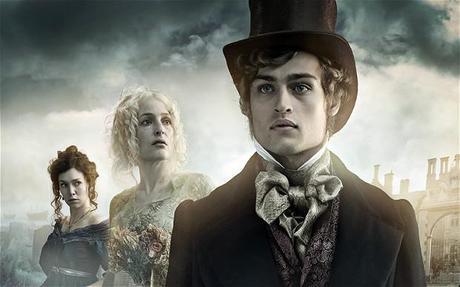
Estella : "I have been bent and broken, but — I hope — into a better shape." (from the book)Let's start from the end. Yes, right from the end. I'm afraid this will be a major spoiler if you haven't read Dickens's novel yet. So, you are warned. I've just finished watching this beautiful new BBC adaptation of Great Expectations and I'm delighted they've chosen Dickens's revised ending, unlikely the previous BBC version. This time Pip and Estella meet again at Satis House ...
"We are friends," said I, rising and bending over her, as she rose from the bench. "And will continue friends apart," said Estella. I took her hand in mine, and we went out of the ruined place; and, as the morning mists had risen long ago when I first left the forge, so the evening mists were rising now, and in all the broad expanse of tranquil light they showed to me, I saw no shadow of another parting from her". (from the novel)Looking rightly into Estella's eyes and wrapping her hand into his, Pip is sure they will never be parted again. Actually, I didn't mind the sad epilogue Dickens had chosen to write at first (it is the end I've got in my printed edition) and I always thought it was perfect, very sad but perfect. On the other hand, I'm now happy BBC has chosen to enlighten the darkness in this story with a romantic happy ending. And now ... we can go back to the start!
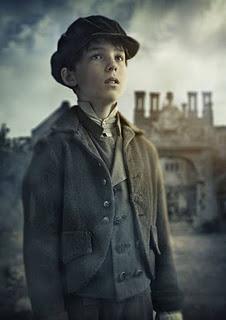
The story (from BBC Press Pack). Eleven-year-old orphan, Pip, runs into an escaped convict on the marshes near his home. The convict, Magwitch, orders the boy to steal a file from his Uncle Joe's forge to remove his shackles. The terrified Pip returns with the file and some food – and this innocent act of kindness is set to have far reaching consequences for them both.Meanwhile, Miss Havisham the reclusive owner of grand Satis House, has requested a boy be sent to her; Pip is to be a playmate to her adopted daughter Estella. Miss Havisham encourages Pip to believe that he might be destined for a future beyond the marshes, a future linked to that of beautiful Estella. Pip's hopes are dashed, though, when Miss Havisham pays for him to be apprenticed to Joe as a blacksmith; it seems his dreams of greater things were unfounded.
At first Pip struggles to come to terms with a life in the forge but eventually he accepts this as his fate. However, everything changes when a lawyer from London, Jaggers, makes a surprise visit. He informs the now adult Pip (Douglas Booth) that he is a young man of great expectations and will inherit a fortune when he becomes twenty-one. There is one condition. Pip must not enquire into the identity of his benefactor; this will remain secret until that person chooses to reveal themselves. In the meantime Jaggers is his guardian. Pip sets out for London leaving all he knows behind to pursue his new life, with his heart set on seeing Estella again.
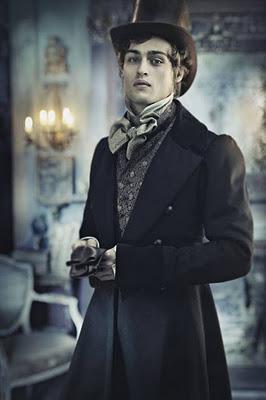 This new three- part BBC series is very beautifully filmed tense, noir drama and it got directly to my heart. I find it succeeds more than other versions - which tried to soften these features instead - in visually rendering all the sadness, the tragicality, the gloom, even the violence Dickens wanted to convey in his briefest but, according to many, best- written novel.
This new three- part BBC series is very beautifully filmed tense, noir drama and it got directly to my heart. I find it succeeds more than other versions - which tried to soften these features instead - in visually rendering all the sadness, the tragicality, the gloom, even the violence Dickens wanted to convey in his briefest but, according to many, best- written novel. Douglas Booth, 19, is Pip and I've read that he has immediately won a legion of admirers.Well, he's stunningly beautiful and his Pip is so incredibly sweet. This teenager's features, his eyes and his rare, sudden smile pierced the screen and the Victorian elegant attire suited him perfectly (he was a model for Burberry). Pip is incredibly good, incredibly naive and his journey through the story is full of suffering and tragic revelations. Like Oliver Twist or David Copperfield he often doesn't understand or doesn't realize how wicked adults actually are.
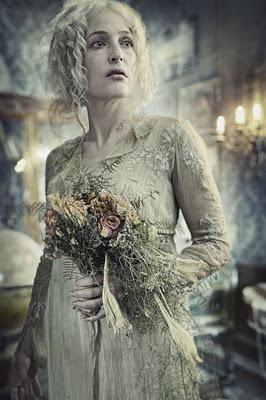 Gillian Henderson was brilliant as ghastly Miss Havisham, characterizing her with her childish voice, death-like paleness, staring eyes, wicked eerie appearance , festering skin, and claustrophobic self - imprisonment in her decaying, spectral home - where she awkwardly welcomes Pip - Satis House. She is psychotically manipulative and psychologically damages both Pip and Estella as children.
Gillian Henderson was brilliant as ghastly Miss Havisham, characterizing her with her childish voice, death-like paleness, staring eyes, wicked eerie appearance , festering skin, and claustrophobic self - imprisonment in her decaying, spectral home - where she awkwardly welcomes Pip - Satis House. She is psychotically manipulative and psychologically damages both Pip and Estella as children. In the cast, lots of well-known , familiar faces from British TV (follow the links and discover where you've already seen them):
Estella, the poor orphan brought up by Miss Havisham and trained to deny love and to believe she doesn't own a heart, is Vanessa Kirby. Herbert Pocket, Pip's loyal friend in London, is Harry Lloyd; Magwitch, the convict Pip's helps as a child and who will change his life, is Ray Winstone; Jaggers, the formidable lawyer who's Pip's guardian in London, is David Suchet; Joe Gargery, Pip's brother-in-law, the village blacksmith who brought him up with his overbearing wife, is Shaun Dooley; Drummle, Pip's model as a gentleman, then rival in his love for Estella is Tom Burke.
The Book
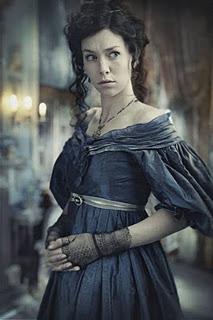 As it usually happens, there are several changes or cuts respect to the original novel, but they are not relevant. At least, I didn't mind them at all.
As it usually happens, there are several changes or cuts respect to the original novel, but they are not relevant. At least, I didn't mind them at all.Great Expectations is the latest of Charles Dickens's novels I read and it has become my favorite so far. Dickens has the power of making me smile, laugh, reflect on serious matters, be astonished at his skillfullness as a story-teller, be moved to tears and all in one story. I read it 5 or 6 years ago in summer and it got me so involved I went on reading at night to know what was going to happen to poor Pip.
Though not considered as autobiographical as David Copperfield, which he had published some ten years earlier, the character of Pip represented a Dickens who had learned some hard lessons in his later life. Especially strong throughout the novel are the concepts of fraternal and romantic love, how society thwarts them, how a man should find them. Dickens had left his wife at that time and there were rumours of an affair with a young actress, Ellen Ternan.
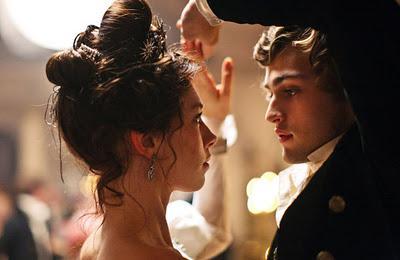 For financial reasons, Dickens had to shorten the novel, making it one of his tighter and better written stories. It was published in serial form, as were all of his novels, and the reader can still see the rhythm of suspense and resolution every couple of chapters that kept all of England waiting for the next issue, and me , as I told you, awake at night.
For financial reasons, Dickens had to shorten the novel, making it one of his tighter and better written stories. It was published in serial form, as were all of his novels, and the reader can still see the rhythm of suspense and resolution every couple of chapters that kept all of England waiting for the next issue, and me , as I told you, awake at night.All in all, Great Expectations is considered the best balanced of all of Dickens' novels, though a controversy still persists over the ending. Dickens had originally written an ending where Pip and Estella never get back together. Many critics, including George Bernard Shaw, believe that this rather depressing ending was more consistent with the overall theme and tone of the novel, which began, continued, and perhaps should have finished with a serious, unhappy note. Nevertheless, Dickens published the ending where all is forgiven and Estella and Pip walk out of the Satis House garden together.
Previous and upcoming adaptations
I have already seen Great Expectations adapted in a couple of versions: the previous BBC adaptation of this novel, which dates back to 1999 , and an American movie (1998), loosely based on the novel, with Ethan Hawke, Gwyneth Paltrow, Anne Bancroft and Robert De Niro, which transferred the story to nowadays and to the USA.
Now I'm eagerly waiting to see the 2012 film adaptation directed by Mike Newell and starring Ralph Fiennes as Magwitch, Helena Bonham Carter as Miss Havisham, Holliday Grainger as Estella and Jeremy Irvine as Pip.
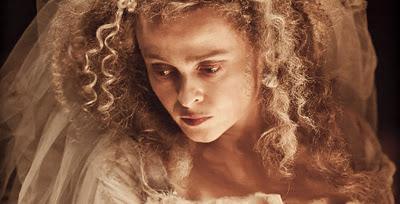
Helena Bonham Carter as Miss Havinsham in the upcoming movie
There's a lot of Dickens coming out in 2012 since it is the year marking the Bicentenary of his birth! (see Dickens on the BBC and Dickens's Bicentenary Official Site)


posted on 27 April at 15:05
Its Gillian Anderson not Henderson. Please check. She is so famous from X-Files.